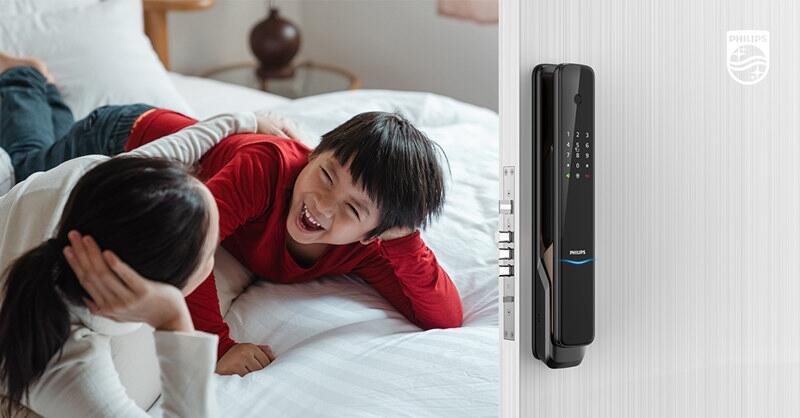Smart locks’ simplicity and increased security have contributed to their rapid popularity as home automation begins to transform our daily lives. One question that anybody considering installing a smart lock must be answered is what happens if the power goes off.
Whether your smart lock is battery-operated or hardwired, we’ll discuss the possible effects of an outage here. With this knowledge, you can confidently choose the finest smart lock system, having Philips smart locks stand out as a top option for small companies and all consumers.
How Smart Locks Function?
Smart locks are high-tech gadgets that provide safety and comfort in the home or workplace. You must thoroughly understand how these locks operate to choose the best smart lock for your requirements. This section examines smart locks to reveal their inner workings and highlight their most useful features.
- Auto-Unlocking Door Locks
Keys are no longer necessary, thanks to keyless access solutions provided by smart locks. Keypad codes, fingerprint scanning, and smartphone integration are just a few of the different entry methods used by these systems.
- Access and Networking Choices
Smart locks use connectivity options to exchange information with approved gadgets. Bluetooth, Wi-Fi, or a mix of the two might be used for the connection. While Wi-Fi allows for remote access and control, Bluetooth is better suited for close-range interactions.
- Authentication Mechanisms
Smart locks offer strong authentication procedures to keep users’ belongings safe. These safeguards ensure that only authorized users get access. Authentication methods through a smartphone app, biometrics, or PINs are all viable options.
- Connectivity to Smart Home Infrastructure
Integration with other smart home devices is a common feature of smart locks, allowing for hands-free operation through voice commands or mobile apps. The smart home experience is improved when integrated with third-party systems such as Amazon Alexa or Google Assistant.
- Power Supplies
Power is necessary for the operation of smart locks. They work with either batteries or wires. Smart locks that run on batteries are convenient and versatile, while locks connected to the building’s electrical system are always operational.
Why Philips Smart Locks are Best for Buying and Use?
When looking for a high-quality smart lock, Philips is an excellent option. Philips’ smart locks are great for homes and businesses because of their useful features and functions.
- Superior Safety Measures: Strong encryption methods and tamper detection techniques are integral to Philip’s smart locks. This guarantees that any efforts to gain unauthorized entry are uncovered and stopped.
- Easy-to-Use Design: The Philips smart locks‘ straightforward design makes them a breeze to install and use. Access control, temporary code generation, and lock monitoring are all simplified with the companion mobile app.
- Flexible Choices: Philips has many different types of smart locks available to meet various requirements. If you’re looking for a biometric lock or a keypad entry system, Philips has you covered. You can invest in Philips manufacturers for your small business.
- Longevity and Dependability: The smart locks made by Philips are meant to endure and work consistently well. They are put through several tests to guarantee their longevity and efficiency.
- Competitive Pricing: All types of clients, from sole proprietors to large corporations, may afford Philips smart locks because of their reasonable pricing and impressive feature set.
As a result, understanding the inner workings of smart locks is essential for picking the right system for the home or company. The cutting-edge features, user-friendly interface, adaptability, durability, and affordable price tag of Philips smart locks make them attractive. If you want to upgrade your business, consider investing in Philips smart locks for their advantages.
Smart Locks and Power Outages
Smart locks are electrical gadgets that might have trouble functioning during a power loss. In this regard, Philips smart locks stand out as the ideal alternative since its manufacturers have considered and addressed the possible problems and effects of power outages on smart lock performance.
- Possible Problems When the Power Goes Out
The loss of electricity is the biggest issue with smart locks during a blackout. Some features of the smart lock, such as remote access, keypad operation, and biometric verification, may be compromised if the device loses power. Because of this, users may have temporary difficulties getting to and around your home.
- Impacts on Smart Lock Performance
There are following impacts on smart lock performance below:
Remote Access
If the power goes out, smart locks that use Wi-Fi to connect to the cloud server may stop receiving updates and stop being accessed remotely. However, some smart locks, such as the Philips smart lock, have supplementary connection alternatives like Bluetooth, enabling you to continue operating the lock locally even when there is no power.
Operation of the Keypad
Power is often needed to operate smart locks like keypad entry systems. If the lock is powered purely by electricity, the keypad cannot work if the power goes off. However, battery-operated versions of Philips’ smart locks are available, so the keypad will continue to work in the event of a blackout.
Authentication Using Biometrics
Power outages might pose a problem for biometric smart locks that use methods like fingerprint recognition for identification. The biometric sensors may not work if the power goes out, making this entry mode unavailable.
Nonetheless, power interruptions won’t affect the performance of Philips smart locks since they use a combination of biometric identification and battery-powered operation.
Power outages and smart locks might cause problems, but Philips smart locks are the ideal solution. Keypad entry systems and biometric authentication may be relied upon to continue working even if the power goes out since they run on batteries.
When there is a breakdown in distant communication, such as during a power outage, the various connectivity alternatives, including Bluetooth, enable the local operation and access.
What is the Importance of Battery Life and Regular Maintenance of Smart Lock?
Power consumption is a major concern for smart locks that run off batteries. The energy efficiency features included in Philips smart locks maximize battery life and save costs. How often a lock is used, what kind of batteries are installed, and what features and functions it has affected how long a set of batteries will last.
Smart locks that run on batteries need regular maintenance to function properly. Regular battery checks and replacements are suggested to prevent sudden power outages. Most smart locks include low battery indications to inform customers when new batteries are needed.
It is recommended to use high-quality batteries appropriate for smart lock applications to maximize battery life and minimize the danger of power interruptions. Always having backup batteries on hand is another sensible precaution to avoid lockouts and provide continuous access control.
The battery power management technologies included in smart locks like Philips ensure continued operation even during a power failure. These locks allow home and business owners to rest easy by offering constant access control, even when the power goes out. It’s important to maintain routine maintenance, check the battery level, and use high-quality batteries to get the most out of the smart lock.
What about Hardwired Smart Locks?
Smart locks that are hardwired into a building’s electrical system are a great option for individuals who need a constant flow of electricity. Smart locks that are hardwired into a structure instead of using batteries do not need any additional batteries. Let’s look at how hardwired smart locks vary in their power requirements and benefits.
- Hardwired Smart Locks and Power Supply
Locks that are hardwired into a building’s electrical system are also known as electric smart locks. This wired connection supplies the lock with continuous power, eliminating the need for batteries or regular charging. Smart locks connected to a building’s electrical system have a steady and consistent power supply.
- Advantages of Hardwired Smart Locks during Power Outages
There are the following advantages of hardwired smart locks during power outages:
Continuous Service
The capacity of hardwired smart locks like the Philips smart lock series to continue working in the event of a power loss is a major benefit of such devices. They will continue to provide customers access to the land at all times, regardless of whether or not the power is on.
Improved Safety and Security
Even during a power outage, the house will be protected with a hardwired smart lock. While conventional locks may be vulnerable to picking or forceful entry during such periods, hardwired smart locks stay safe and protect the property.
Connectivity to Safety and Security Measures
In many cases, additional security systems may be easily integrated with hardwired smart locks. Because of this connection, access points can now be managed and monitored from a single location, which is more secure and convenient.
Reduced Maintenance
Smart locks that are hardwired into a building eliminate the hassle of dealing with dead batteries. Time is saved, and the possibility of the lock failing due to exhausted batteries is removed.
Using a hardwired smart lock, such as the Philips smart lock series, has clear benefits. Because they don’t use batteries but instead take power from the building’s electrical system, these locks continue working and are more secure even if the power goes out. Think about Philips smart locks for a worry-free and trustworthy smart lock experience.
What are the Considerations for Backup Power Solutions?
Knowing how smart locks work isn’t enough; you must think about backup power options to guarantee uninterrupted functioning. The smart locks from Philips come with various battery backups, giving you extra peace of mind and security.
- Provide Several Battery Backup Choices for Smart Locks
A battery backup and an emergency power source are available with Philips smart locks. When there is a power outage, the smart lock may still work due to the battery backup system. This will keep the building accessible even if the main power is out. Connecting the smart lock to an external power source, such as a power bank or a generator, is another option for maintaining electricity during a prolonged blackout.
- Discuss the Benefits and Limitations of Each Backup Power Solution
Philips smart locks provide a straightforward battery backup option. The lock’s operation is seldom interrupted because batteries may be swapped out or recharged quickly. However, checking battery life cycles regularly and replacing batteries as required is critical.
However, the emergency power supply alternative is more involved in setup but delivers uninterrupted power during protracted blackouts. The backup power solutions provided by Philips smart locks are versatile and trustworthy, guaranteeing the safety of your home or business even if the power goes out.
What are the Precautions and Maintenance for Power Outages with Smart Locks?
Taking safety measures and maintaining smart locks regularly is crucial for optimum functioning, particularly during power outages. In the event of a power loss, here are some helpful suggestions for keeping the smart lock operational:
- Contingency Planning for Blackouts
Here are some things to keep in mind to make plans for the possibility of a power outage:
- Have a UPS (Uninterruptible Power Supply) or extra batteries if your primary power source goes down.
- Learn how to use the manual override function on the smart locks in case you ever need to gain entrance to the house in an emergency.
- Ensure it’s a physical copy of the key in case the electronic ones stop working.
- Why Battery Maintenance Is Crucial
A smart lock won’t stop working if the batteries aren’t checked and replaced regularly.
- First, always change batteries when directed to do so by the manufacturer.
- Second, always have a supply of extra batteries on hand and check their condition regularly.
- Third, use smart lock systems with battery monitoring capabilities or set up reminders to check battery levels.
By taking these measures and regularly keeping smart locks in good working order, users may reduce the likelihood of malfunctions due to power interruptions. Taking good care of the smart lock system and being ready for the unexpected is essential to getting the most out of it.
Concluding Remarks
In conclusion, knowing what will happen if the power goes out is important before investing in a smart lock. Proactively choose a reputable smart lock manufacturer like Philips; you’ll have access to backup power solutions and cutting-edge capabilities during a power outage.
If you’re looking for a smart lock that can stand the test of time for your company and customers, look no further than Philips. When properly installed and maintained, Philips smart locks may provide users peace of mind by allowing them to regulate who can enter their building at all times, even if the power goes out.




